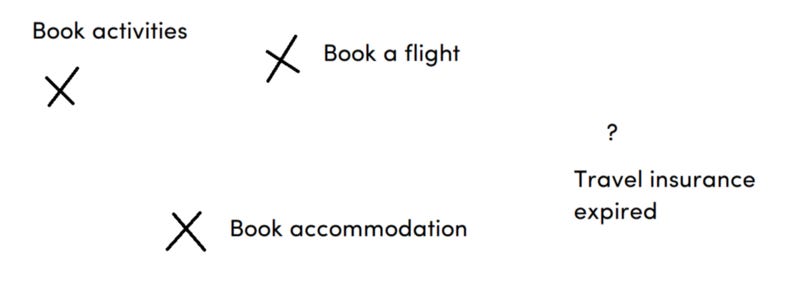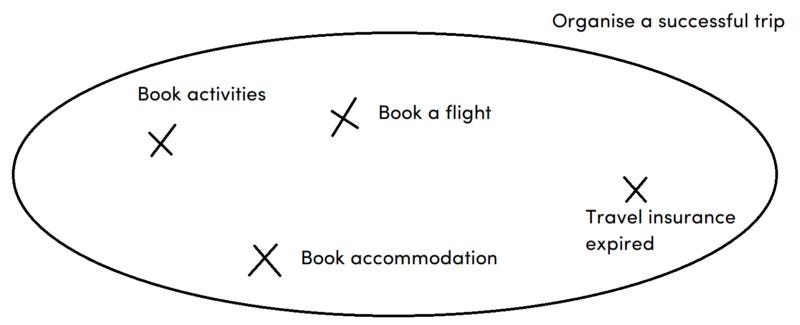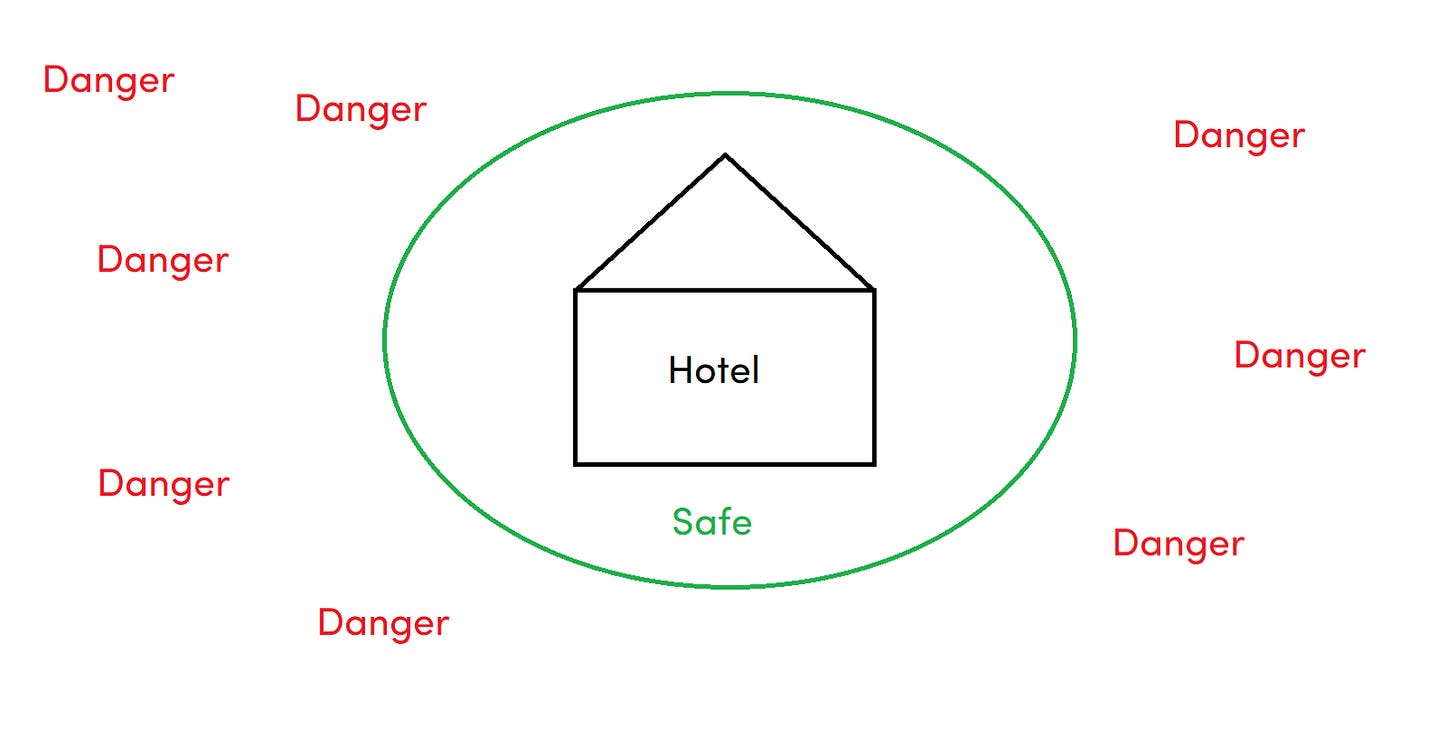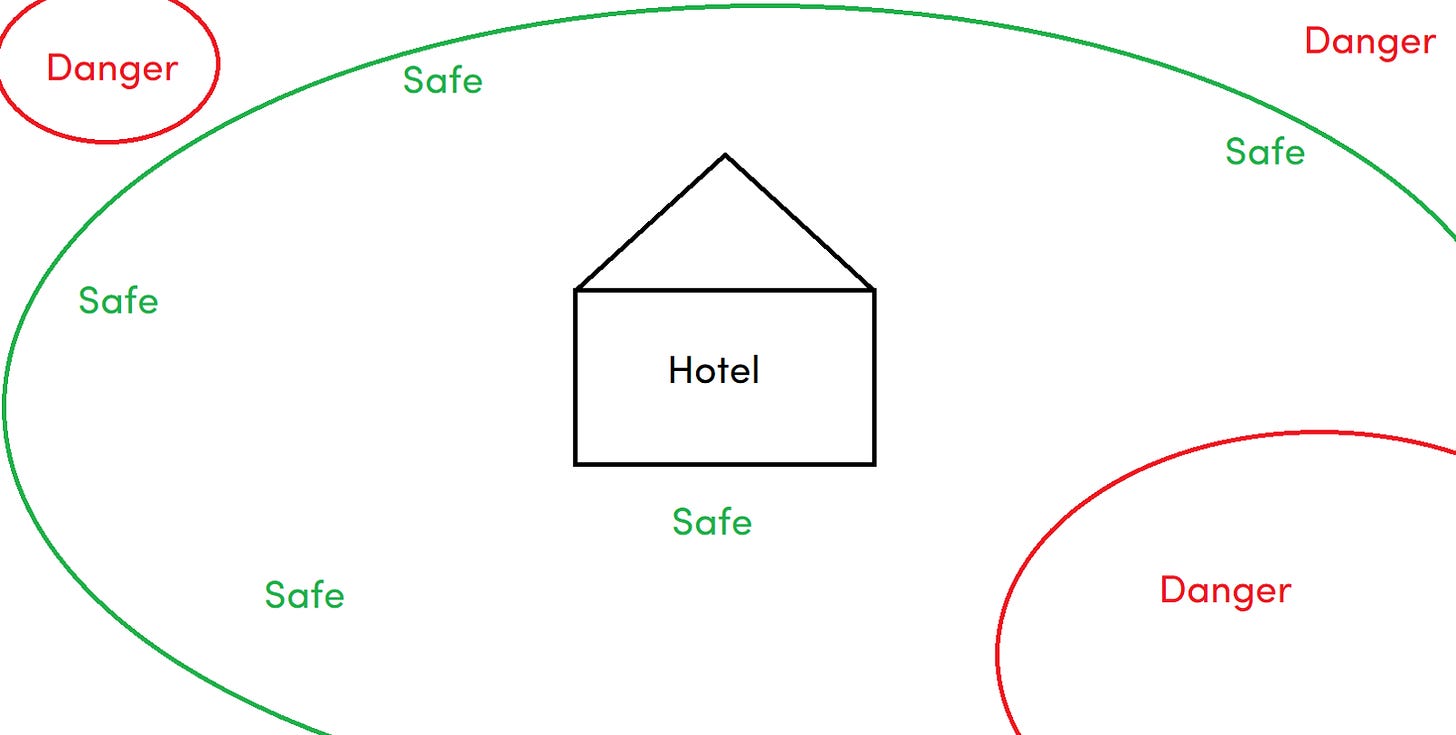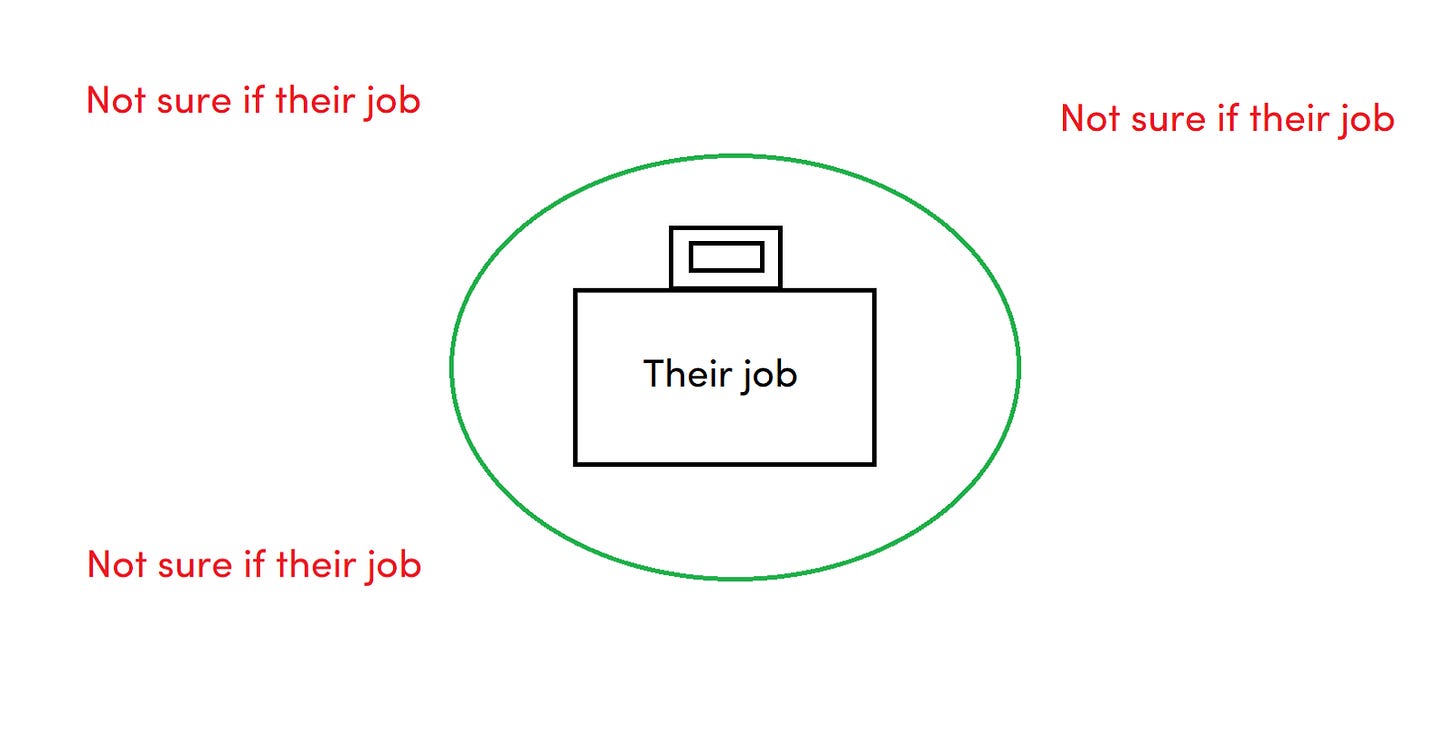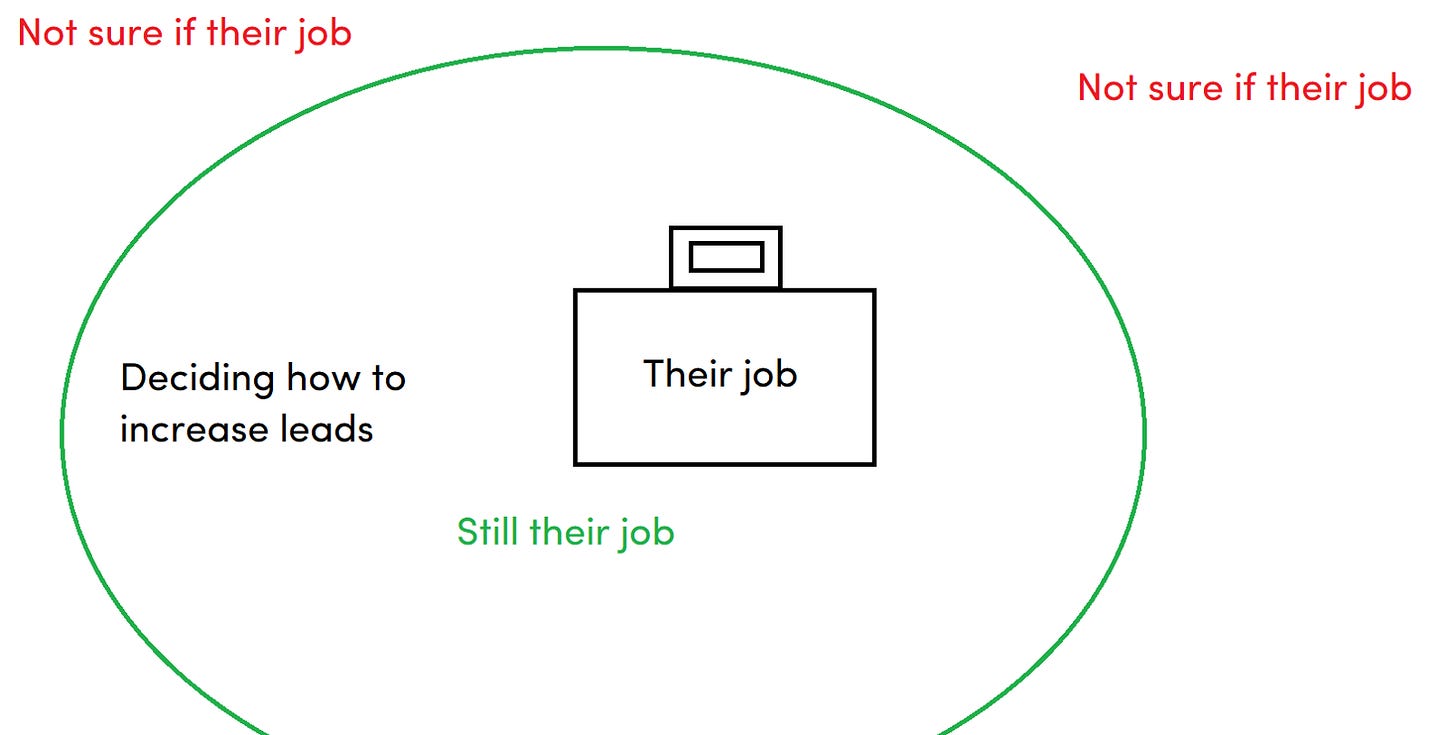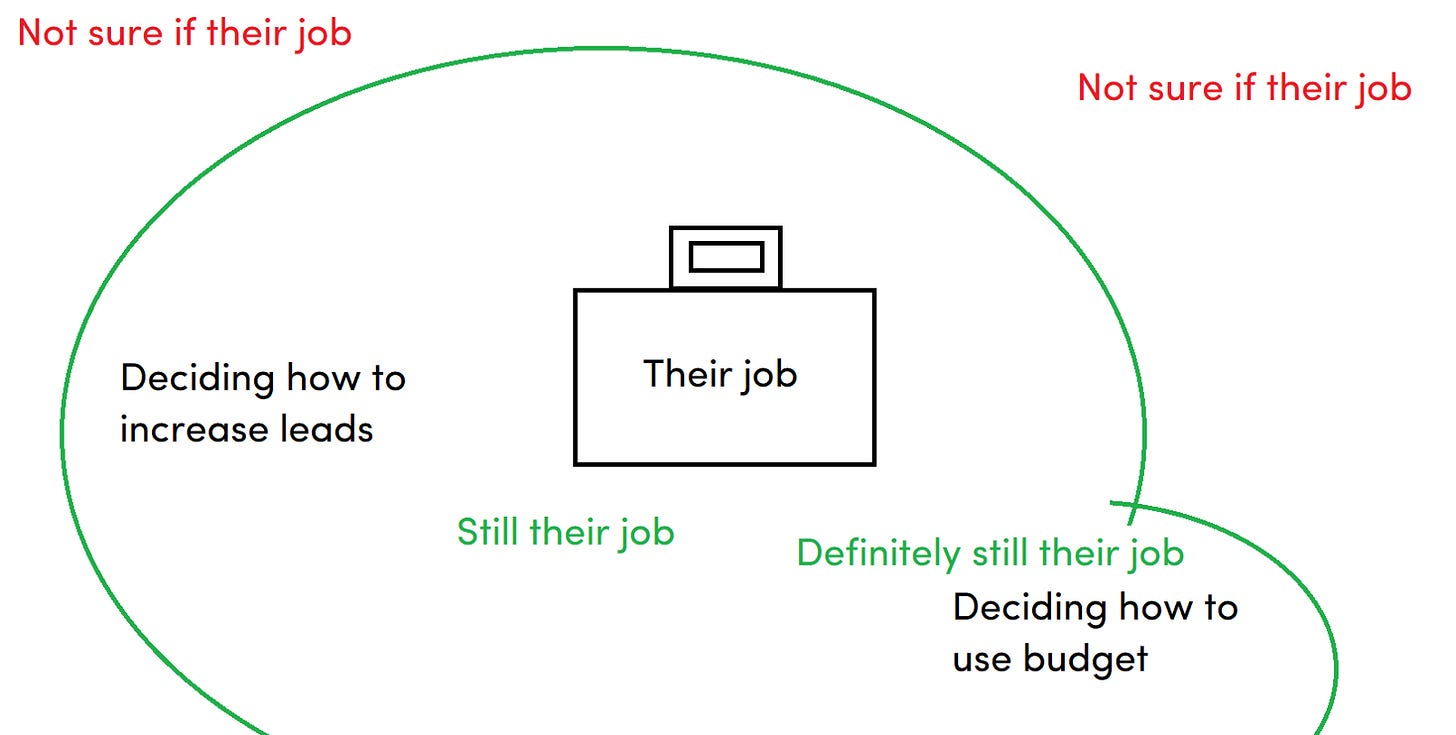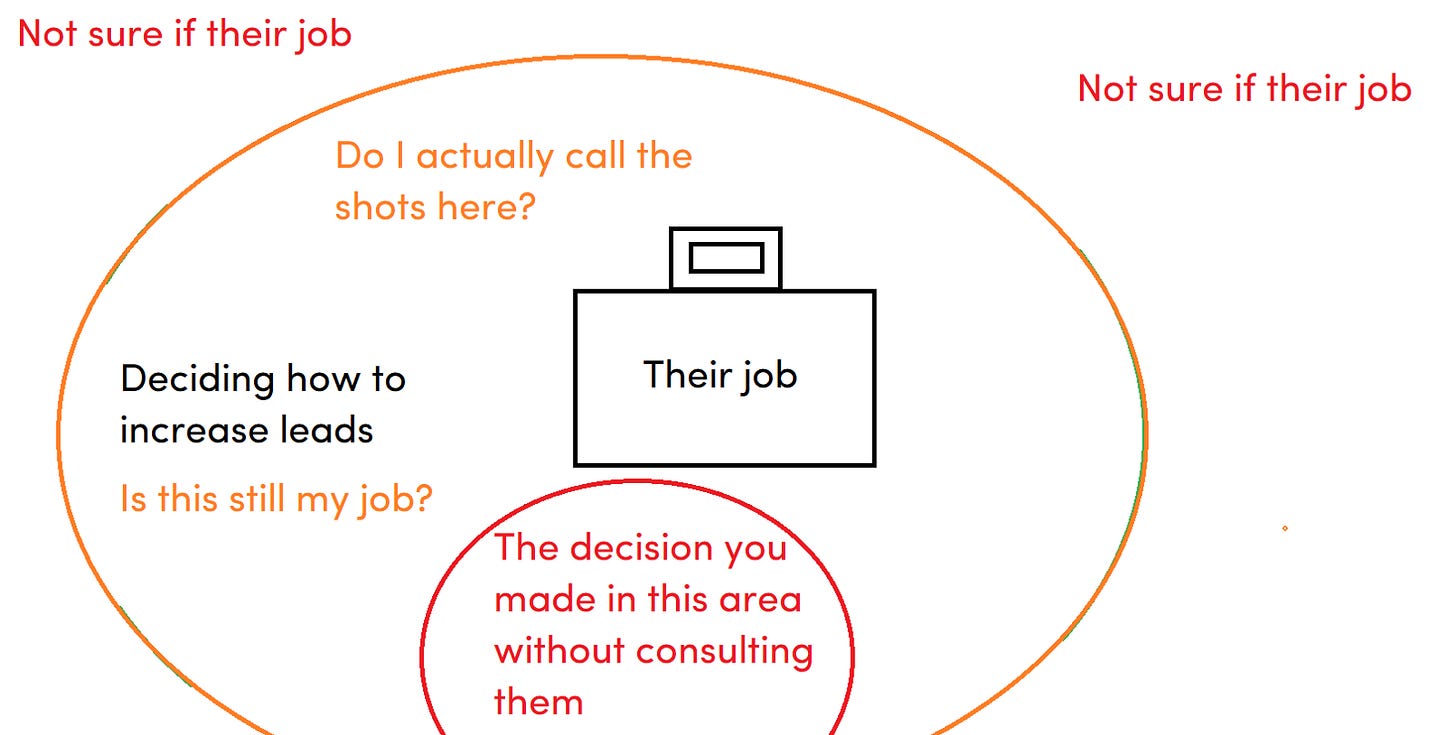Delegate ownership, not tasks
How to be the leader you want to be
If there’s one thing we can count on seeing in our LinkedIn news feed, it’s inspirational leadership advice telling us to trust our people and give them autonomy. But why is it so hard to pull off in practice?
My perspective is that many leaders don’t fully understand or apply the concept of ownership.
This article will cover:
What is ownership
Defining an area of ownership
Helping someone expand into their area of ownership
Protecting their area of ownership
Team member: Where would you like me to focus next?
You: I trust you. I will support your decision.
Team member: *Hesitantly picks wrong thing to focus on*
You: *Cries internally*
What is ownership really?
Mark Manson has a great line in his book, The Subtle Art of Not Giving a F*ck.
If you woke up one day and there was a newborn baby on your doorstep, it would not be your fault that baby was put there, but the baby would now be your responsibility. You would have to choose what to do.
We might call the police or the local hospital. We would probably do everything in our power to make sure that this baby finds it’s way to somewhere safe.
We wouldn’t think “oh that’s not my job”, or “oh I’m not sure what to do here so I guess I’ll just leave the baby out in the cold because no-one told me to do otherwise”. This is us taking ownership.
When we’re led well at our organisation, we feel a similar sense of ownership in our role. We’re comfortable taking the initiative, or thinking for ourselves, or making sure things go right (without anyone needing to tell us to do so).
The goal, is to help our team feel responsible for the things we want them to be responsible for.
The default habit of most people is to delegate tasks
If we’re really focused on hitting a certain goal, or prevent something bad from happening, we might feel like we’re the only person who’s thinking about that or really understands it.
It can be tempting to give orders and say just get it done.
It can be easy to feel frustrated when people don’t give it the same priority, attention, or care that we think it deserves.
However, if we’re telling people what to do — we’re not actually delegating correctly.
Delegating tasks doesn’t work
It’s easy to delegate tasks poorly. It’s difficult to understand the full picture of what challenges our team is encountering and we might not understand why the task is a bad idea.
Delegating tasks is inefficient. It’s difficult for someone to understand the full context behind the task and make decisions in a way that achieves the real outcome.
Delegating tasks is not scalable. Determining the right tasks and prioritising them requires thinking — and if we have a team that’s relying on us to do all that thinking, life is going to be hard. We will feel like everyone is demanding our attention, and we will be the bottleneck in the team.
Delegating tasks is demoralising. No talented team member wants to feel like their sole role is to just do things that we tell them to do.
How to delegate genuine ownership
Maybe you’ve had a conversation like this before:
You: Where are we now in relation to the goal?
Team member: Uhhh going okay I guess?
You: Is anything stopping you from making progress?
Team member: *Blank stare*
Ownership doesn’t happen automatically — it needs to be actively cultivated.
Defining the area of ownership
Let’s say we plan our own business trips, and it takes forever. So one day, we wake up and think gosh, wouldn’t it be great if someone could do that for me.
So we hire a travel assistant. They show up on the first day, eager and enthusiastic. We ask them to book accommodation, flights, and some activities, and they rush away and get started.
But what happens if we forgot to mention a specific task? Would they see it as part of their role?
For anyone to understand their area of ownership:
They need to know what they’re trying to achieve (make sure this baby is safe, or organise a successful trip)
They need to have a rough idea of the sort of things they need to do to achieve it (contact emergency service and provide care while waiting, or book trip-related things and sort everything out)
This way, they don’t need to be told that travel insurance is our responsibility — they can probably infer it themselves.
And if anything else unexpected comes up, they have the confidence that it’s their job to do something about it.
Why does the role exist?
If we can’t articulate a clear objective to the person we’re delegating to, we are forcing them to guess what their real objective is.
If we’ve done a really bad job of delegating, we might not even know what the real objective is ourselves.
If this is the case, we’re setting them up to fail. They could cure cancer and we might still think “oh hmmm that’s not what I actually wanted”.
There’s a reason we wanted someone for this role. Our first job to clarify and articulate it, so they understand what their area of ownership actually is.
Customer service example:
Bad: Your role is to answer emails. Just answer questions and get back to people and stuff so I don’t have to do it
Good: Your role is to make sure our customers are happy. Your responsibility includes answering emails, calls, and resolving the problems our customers contact us about.
However, defining this is just the first step.
Helping someone expand into their area of ownership
When I travel to a new country with a vastly different culture, it’s always a gradual process to get comfortable.
Initially, I feel safe and comfortable inside the hotel or Airbnb and everywhere else feels like “danger danger”.
But gradually, I start exploring.
I might take a walk around the block, check out a few local stores or restaurants, and chat with a few locals.
If I realise I’ve wandered too far, I’ll nervously make my way back to somewhere that feels safe.
Creating space
Just like a traveller is feeling out the boundaries of what is safe and what isn’t safe, a person in a new role is feeling out what is their responsibility and what isn’t. They are finding their area of ownership.
Our role is to create space for them to expand their area of ownership, and to help them get better at making these decisions.
Let’s say a Marketing Manager has just joined our team.
Marketing Manager: Okay! I’ve had coffee meetings with everyone on the team and I think I’m up to speed on everything that’s happening. What should I focus on first?
Instead of answering with:
Why don’t you start by evaluating the performance of all our current marketing channels?
We could try:
Your objective is to increase our leads by 30% this quarter. What might be a good place to start?
And have a conversation around it.
This shows them that this is their area. We’ve helped them understand their goals and area of ownership, but what they do is up to them.
By putting them in the driver’s seat, we’ve made it real and tangible. They suddenly think Oh crap, what am I, personally, physically, actually going to do?
Just don’t set this too big, too quickly, or it can get overwhelming.
What if they don’t know the answer?
The area of ownership might be too unclear because we didn’t define it well, communicate it well, or set the adequate context.
Or, we’ve asked them to do something that they thought was outside their area of ownership. They have no context, haven’t thought about it, and it doesn’t feel like something they’re responsible for.
Or, if they have no idea what to do, the area of ownership might be too large for their skills & experience and we picked the wrong person.
In any case, that’s on us — not them. We haven’t set them up for success, and we need to reflect on what we need to change.
Don’t be annoying
We can’t answer every question. But this doesn’t mean we tell them nothing.
Marketing Manager: Hey how do I book a meeting room?
You: That’s a great question! What do you think?
We need to be thoughtful with our responses by:
Directly answering questions related to what is within our own area of ownership
Asking thoughtful questions related to whatever is in their area of ownership. Aka coaching.
If neither, just try to be helpful
Marketing Manager: Should I focus our marketing budget on Google Adwords, Facebook Ads, or Television?
Instead of answering with:
“Probably Facebook I reckon”
We could try:
Well, our company is shifting away from TV to purely digital, so it will be between Adwords and Facebook.
What do you think you need to know in order to make a good decision?
Why is that?
Every time we do this, we transfer a bit of ownership from us to them, and reinforces that we are not the one making the decision.
This still applies when things are going wrong
Rain or shine, it’s their responsibility.
Marketing Manager: Oh my god our signups are tanking
You: Cool. What are we going to do about it?
We have to stay in the information loop, coach them to make better decisions, but not bear the direct responsibility of thinking through the decision ourselves.
Call them forward to learn, improve and grow, rather than to just get something sorted out.
Michael Bungay Stanier, The Coaching Habit
Protecting their area of ownership
When watching events unfold from afar, we might notice certain problems appearing or certain things that need fixing.
If we step into someone’s area of ownership, we’re going to do damage.
It’s incredibly demoralising because not only have you taken away their sense of ownership, you’ve made them question whether they ever had any in the first place.
Let’s say we lead a sales team and one of our salespeople has offered a customer a discount that is much larger than what we are comfortable with. We need to approach the situation in a way that reaffirms that they are the decision maker within their area, but allows us to provide insight and context to help them make a better decision.
Instead of saying:
That discount you’ve offered was far too large. I’ve contacted the client to let them know it was not authorised.
We could try:
Hey, I noticed that you offered a discount much larger than normal. I’d love to hear your thought process behind this as I’m worried about setting a bad precedent.
Maybe they’ve got a really compelling case for why this is a good idea, and we realise that they’ve made a great decision.
Maybe it was a bad decision, and we help them realise why. They can learn something, and fix it themselves.
Either way, the issue gets resolved, and you have helped them further grow into their area of ownership.
Continuously provide context and air cover
Our team member should be the expert in their area of ownership, but we will have a much broader view and understand how their area connects to other areas in the organisation.
As a result, we need to help them become aware of things that might affect their area, and help them prepare as best as they can.
These could be things like:
Strategic initiatives on the horizon which might require their involvement,
Planned initiatives by other teams
Potential changes to budget and funding that might affect their team
Additionally, we should do our best to reinforce their area of ownership within the organisation. Some things we could do include:
Praising achievements within their area of ownership, and make sure others know what that area of ownership is
Protecting their decisions from stakeholders who love jumping in everywhere and calling the shots
How do we know we’ve delegated well?
When we delegate, we don’t just want that person to “do”, we want them to think for themselves. To take responsibility for their own areas proudly.
For this to happen, they need to feel like their area is something that they can call theirs. No-one wants to put in the extra mile for something that they feel like they have no control over or can be taken away from them at any time.
What we want to do is constantly send the message that this is your area of ownership. And back that up through our own actions.
“You may be able to “buy” a person’s back with a paycheck, position, power, or fear, but a human being’s genius, passion, loyalty, and tenacious creativity are volunteered only.”
L. David Marquet, Turn the Ship Around!
Here are some questions to ask ourselves to check whether we’ve delegated ownership well:
Does my team understand their goals just as much as me?
Does my team care about their goals just as much as me?
Does my team feel comfortable making decisions autonomously?
If I ask them to describe their role, do I resonate with what they say?
Delegation is not about getting others to do the things we don’t have time to do.
It’s a chance to step up as a leader, and help someone step into a role that they are proud to own.
About me
Hi, I’m Jimmy - I’ve spent 10 years leading teams in fast growing tech companies.
This blog / newsletter is a place for me to explore random topics I care about.
If anything looks interesting, subscribe below!




